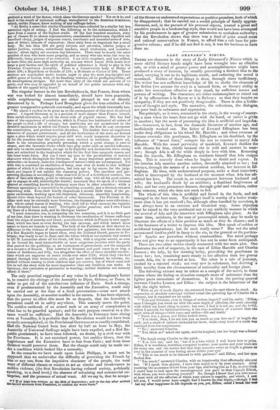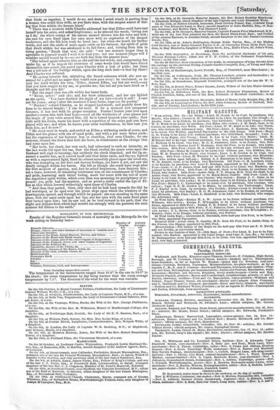LADY GRANARD'S PIECES.
THERE are elements in the story of lady Granard's Nieces which in more skilful literary hands might have been wrought into an effective tale, or with a mind of greater power and accomplishments might have produced a story of interest, by steadily presenting a distinct idea to the mind, carrying it out to its legitimate result, and enforcing the moral it contained. Neither of these things is done, through sheer inefficiency. The writer has not sufficient knowledge of life to clothe the elements of her fiction (we assume the sex) in a natural form, or literary ability to make her conceptions effective as they stand, by sufficient matter and powers of writing. The characters are either commonplace or raised out of it by affectations It la Byron or it la Bulwer ; so that they inspire no sympathy, if they are not positively disagreeable. There is also a feeble- ness of thought and style. The narrative, the reflections, the dialogue, are poor both in substance and expression.
The principle, as it were, contained in the story, is the wrong of marry- ing a man when the heart does not go with the hand, or rather is given to another ; but the mode of presenting the idea is artificial and improba- ble—borrowed, in fact, from the dramatic literature of another age, and inefficiently worked out. The father of Everard Effingham has been under deep obligations to his friend Mr. Harolde ; and when reverses of fortune overtake this gentleman, Mr. Effingham on his deathbed, by the influence of " moral force," compels his son to consent to marry Ada Harolde. With the usual perversity of mankind, Everard dislikes the wife chosen for him, chiefly because she is cold and austere in man- ner; though Ada is all the while deeply in love with him. Returning from his travels, Mr. Effingham so conducts himself that Ada resigns him. This is scarcely done when he begins to doubt and repent. In the interim Ada marries another suitor, devotedly attached to her ; but betrays, through the means of a convenient accident, her interest in Ef- fingham. He then with undetermined purpose, seeks a final interview; which is interrupted by the husband at the moment when Ada has ad- mitted her love. The result is, an estrangement between husband and wife; the husband's death by an accident; a deathbed forgiveness of Ada; and her own premature decease, through grief and vexation, rather than remorse, which she does not seem to feel.
The whole of this idea is artificial and forced in the book, and not managed in the best taste. The subject itself is worthy of a better treat- ment than it has yet received ; for, although often handled by novelists, it has always been in an extreme and theatrical way. Some objection may be raised to the very accidental not to say unlikely manner in which the avowal of Ada and the interview with Effingham take place. At the same time, accidents, in the case of preoccupied minds, may be made to illustrate the effects of a false position as much as they do chance; and it is the business of a writer to impress this idea. Men speak of sudden or accidental temptations; but do such really occur ? Has not the mind accustomed itself to yield in fancy to the sin, in the general or the particu- lar? Sparks are powerless without combustibles. The mind perhaps. does not give way to an opportunity it has not in some form anticipated.
There are two other stories closely connected with the main plot. One illustrates the evil of coquetry, in the case of Elfine Harolde and Charles Lennox; the lady, by her seeming levity, provoking the gentleman to leave her ; but, remaining more steady to her affection than her graver cousin Ada, she is rewarded at last. The other is a tale of jealousy, excited by a rejected rival; not very new in substance, but deriving a little novelty from the circumstances of nationality and foreign place. The following extract may be taken as a sample of the novel, in those scenes where the feeling or situation compels more of substance than the lighter parts necessitate of themselves. It is from the parting quarrel between Charles Lennox and Elfine: the subject is the behaviour of the lady the night before. '
"With an air of mock dignity she retreated from the spot where he stood. An expression of ,absolute contempt writhed round the quivering lips of Charles for a moment, but it vanished ere he spoke. "' Vain and frivolous, even in things of serious import!' said be, sadly.'Elfine,- once I thought you loved me with the same depth of affection, the same sincerity with which my heart clung to yours: but now, I find it is not so; and the levity, which I mistook for lightheartedness, is the true semblance of a nature that can sport with all things—with tears and smiles—life and death.'
There was a pause, and Elfine looked down.
"'You think, then, I do not love you as much as you love me? at length she said; and a shade of sadness darkened her brow, while every trace of a smile WU banished from her countenance.
" Ye.,' answered Charles.
"You think so?' asked she again, and she laughed; but her laugh was a forced one.
"The laugh stung Charles to the cmick.
" • You love me, said he; i
but t is a love which I well know how to prize. Elfine, it is worthless, worthless compared to mine: your smiles and your tears are for every one, and the veriest fool that lisps nonsense earns as bright a glance as ever in the moment of true feeling shone within your eye.' " This is too much to be listeued to with patience! said Elfine, and her eyes flashed fire.
"'Too much !' answered Charles, with an impetuosity that effectually silenced
her. 'If I speak thus plainly, I have been urged to it by your conduct. After receiving the assurance of love from your lips, and loving you as I do, do you think I could bear to look upon the encouragement you gave to that Captain Elliott, with whom you were amusing yourself? No, though I know that you love use— at least with all the affection of which your nature is capable, and which, I now tell you, I would never have sought had I known its real depth,—though I feel hat my after happiness in life depends on you, yet, Elfine, could I break the vow
that binds us together, I would do so; and deem I acted wisely in parting from a woman who could thus trifle, as you have done, with the deepest source of feel- ing that lives within the human heart.'
'There was a moment while Charles addressed her that Elfine could have cast herself into his arms, and asked forgiveness; as he uttered the words, loving you as I do,' the whole energy of his nature seemed thrown into his voice and look; she met his eyes fixed upon her once more with an expression of the deepest tenderness, and abs felt how truly he loved her: but when she heard his further words, and saw the smile of scorn again settle on his features, the spirit of pride that dwelt within her was awakened in its fall force; and, turning from him in rising passion, Break that vow,' she said: "not one moment longer than is agreeable to yourself would I wish it to bind you; not one moment longer will I consider myself bound by it-we are both free from the present time.'
"She turned again towards him as she said the last words, and, compressing her under lip, as if to impede the utterance of some words that would have forced themselves into sound, she gazed upon Charles with a look of pride; but there was a tell-tale of the feelings within, upon the long dark lash-a tear lay there! And Charles was softened.
"He sprang towards her, mistaking the forced calmness which she now as- sumed for a grief and an anger that would soon pass away: he exclaimed, as he took her hand within his own, Elfine, dearest Elfine, say but one word,-say that you have sought to try me, to provoke me; but tell me you have loved as I thought and felt you did.'
"But the anger that was rife within her burst forth.
"'Never, never!' said she; and her brow crimsoned, and her eye lighted as she spoke. You have doubted the depth of my love-doubt it still! I care not for yours: sway! after the insolence I have borne, hope not for pardon.'
"'Pardon!' echoed Charles, as he stepped backwards, and proudly drew his form to its utmost height: I sue for none. If for a moment love conquered firmness, it has met with its proper reception. Pardon ! bestow your love upon another-nurse him with fond hopes-east all the witcheries of your glance and the magic of your voice around him, till he is bowed beneath your spells; then trifle with his rivals, waste his heart with a repetition of the same part you have played with me; and when he knows your utter worthlessness, let him cast you from him, as I do now !' "He stood erect in wrath, and smiled on Elfine a withering smile of scorn; and Elfine met his glance with one of equal pride, and with a yet more bitter smile: but the expression of her features was so startling, that even Charles, for one moment, relaxed the frown that knit his brow, in wonderment at the change that bad come upon her. "Her brow, her cheek, her very neck, had crimsoned to such an intensity, as the last words fell upon her ear, that the blood swelled the azure veins upon the forehead well nigh to bursting; but suddenly the cheek blanched, and the lip as- sumed a marble hue, as it curved itself into that bitter smile, and the eye, lighted as with a supernatural light, fixed its almost unearthly glance upon the loved one, who was trampling on her best and dearest feelings, yet knew it not, nor saw the deadly struggle within her bosom. She felt as though she could have wept after the first moment of passion, and, had he asked forgiveness, have forgiven him: not a trace, however, of remaining tenderness was on the countenance of Charles; and pride, mastering each better feeling, made her cover with the veil of scorn the anguished spirit within, which even then was mourning its precipitancy of re- proach: yes, pride had the mastery, and as proud a smile curled the lips of El- fine as that which lowered witheringly upon those of Charles.
"And thus they parted. Once, only once did he look back towards the idol he bad worshiped, as he sped over the green slope upon which the windows of the drawingroom opened, and through which he passed: she was standing in the same place, with the same smile upon her lips, and her eyes with the same fixed glare were turned upon him; but he saw not, as he trod onward in his path, that the slight and delicate form which had warred too strongly with the passions the next moment fell lifeless to the earth."



























 Previous page
Previous page